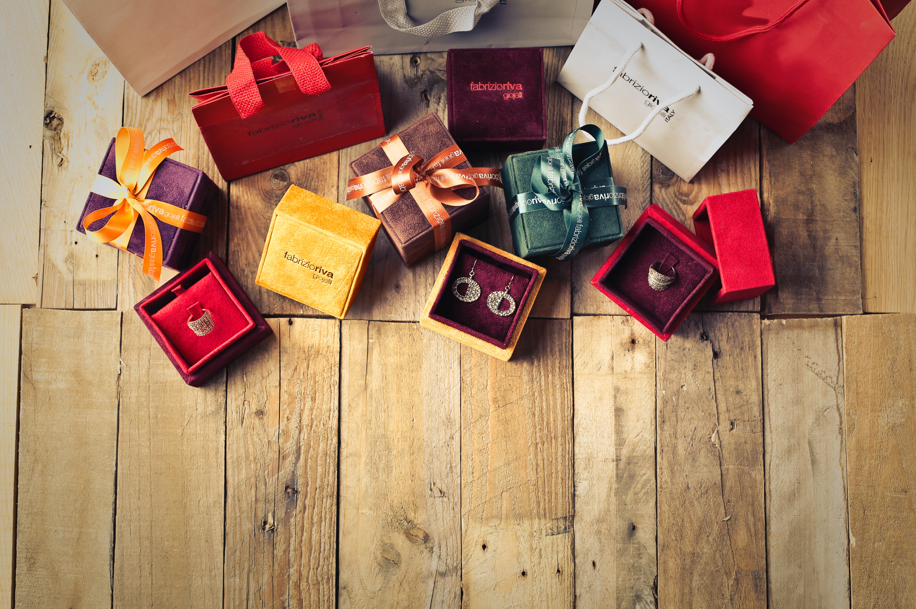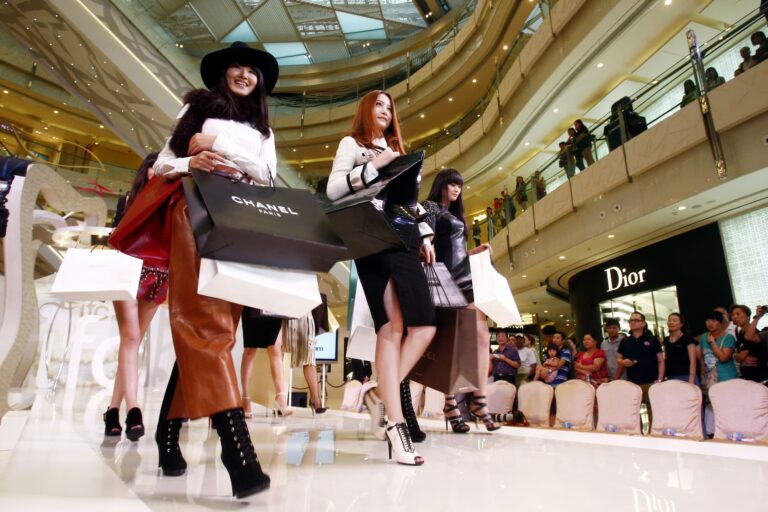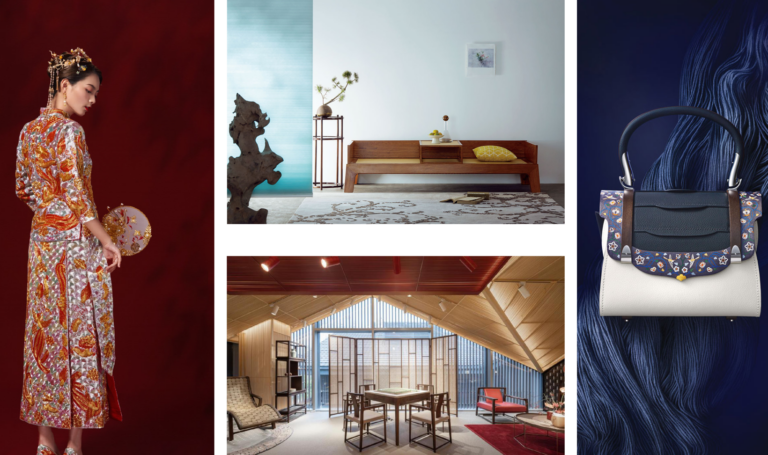Across many cultures, gift giving has stuck out as an important way to express love and commitment in a relationship. China’s gift giving culture expands far beyond romantic relationships to include family, friends and even business relationships, but gift giving in romantic relationships remains tradition during China’s six valentine’s days. Although feminism is gaining momentum in China, gift giving is still regarded as a man’s duty and a symbol of virility, thus when analyzing Chinese male shoppers’ consumer habits, it is important not to forget that in many cases female consumers are going to be the actual end users of the products purchased. One peculiarity of gift giving among Chinese couples is the growing trend of considering explicitly asking their partner for luxury items as a great sign of mutual trust and an appropriate method of testing how much their boyfriend is willing to invest in the relationship, both figuratively and literally.
Indeed, it is getting more and more popular among Chinese girlfriends tagging their fiancés on social media posts showing their desired products expecting them to buy it for them as a gift. Thereby, in 2018, luxury novelties, such as Dyson’s US$550 hair styler, Yves Saint Laurent’s Star Clash lipstick, and the iPhone X, sparked a heated debate on Chinese social networks about whether high-end gifts are a valid unit of measure for love.
When is peak season for gift giving among Chinese couples
Nowadays, China boasts the largest amount of digital buyers in the world and a penetration rate of online shopping that reached 79.1% in 2020. Thus, in order to succeed in China, it is of major importance launching effective e-commerce marketing campaigns, paying special attention to China’s festivals and specific events. Gift giving among Chinese couples peaks during online shopping festivals and love-related celebrations, such as Qixi festival, Valentine’s Day, 520 and Singles’ Day.
Qixi festival, also known as Chinese Valentine’s Day, is a perfect occasion for brands to launch limited-edition collections and special offers in order to intercept Chinese lovers during their quest for the perfect gift. Since such celebration follows the lunar calendar, it takes place every year on a different day and this year it is going to fall on August 14th. However, even though China has its own lovers’ day, young people tend to be open to Western culture and like celebrating Western Valentine’s Day. Therefore, February 14 represents another important date for gift giving among Chinese couples and for brands willing to catch Chinese young consumers’ attention.
Nevertheless, according to research by Vogue Business Insights & Advisory, in 2021, brands mostly preferred communicating and engaging with Chinese couples on 520 festival, on May 20. “520” is not an official celebration: it initially spread as a day for expressing romantic love among Chinese netizens, since the Chinese for “520” sounds like “I love you”, but then it gained more and more popularity and it is currently one of the main occasions for luxury brands to attract Chinese Gen-Z and Millennial consumers.
The main difference with Qixi festival and Western Valentine’s is that 520 is meant as a day for revealing your secret love for your crush. Lastly, despite its name, Singles’ Day on November 11 is another cornerstone of gift giving among Chinese couples and an opportunity for Chinese men to prove their love by purchasing luxury goods as presents for their girlfriends.
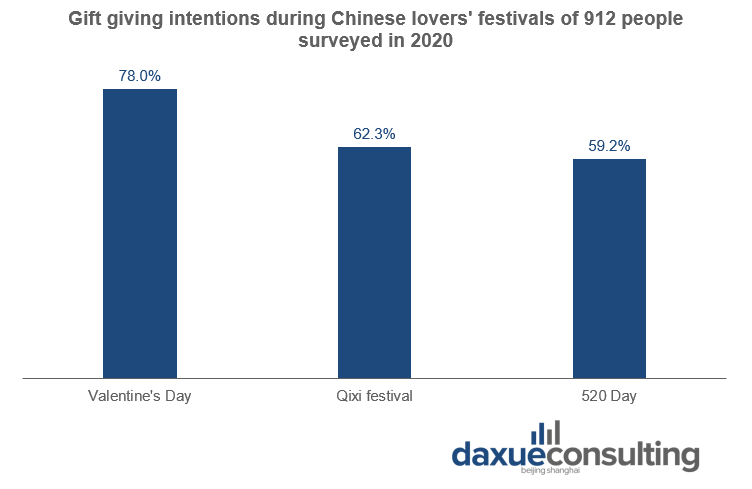
Data source: iiMedia, designed by Daxue Consulting, Gift giving intentions during Chinese lovers’ festivals of 912 people surveyed in 2020, Gift giving culture among Chinese couples
Insight on gift giving consumer behavior among couples in China
In 2018, China’s gift economy was worth about 800 billion RMB, with people born after the 80s representing the main consumer group. According to iiMedia, 14.4% of the people interviewed declared buying presents for their soul mates on Chinese traditional festivals in 2020, spending on average more than 300 RMB. Quality, functionality and price were mentioned as being the main factors affecting Chinese netizens’ purchasing behaviors, while chocolate, flowers, jewels, creative presents and apparel ranked within the top 5 gift giving categories of Chinese lovers’ festivals in 2020. Purchasing cosmetics as a gift is quite common as well, especially lipsticks. Chinese e-commerce giant JD.com reported that in occasion of 2017 Qixi festival, by stacking all the lipsticks sold, it could have been possible building a tower 35 times higher than the Tour Eiffel in Paris, while total perfume bottles sold equaled to 17 times the height of Shanghai Pearl Tower.
Regarding luxury goods, Chinese male and female consumers have different preferences. According to Hurun Chinese Luxury Consumer Survey 2020, men under 30 appreciate receiving electrical devices, watches and red wine as presents, whereas cosmetics, jewelry and accessories are women’s best-loved luxury gifts. Nevertheless, both groups list Louis Vuitton and Chanel in their top 3 favorite brands.
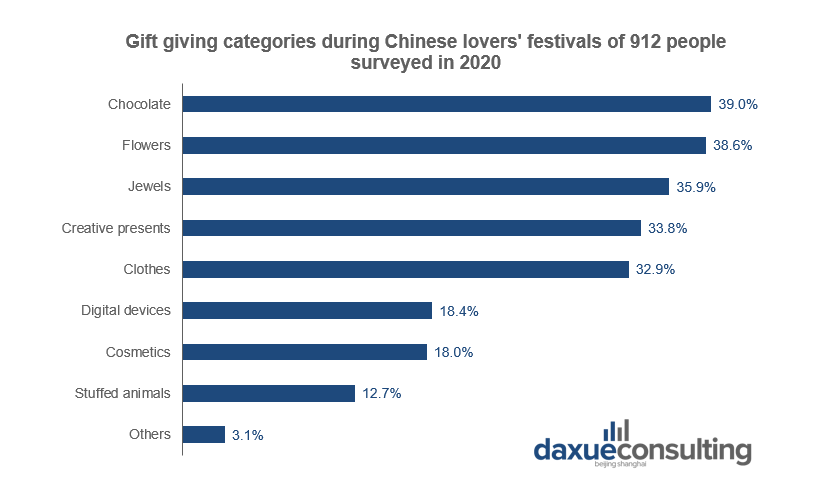
Data source: iiMedia, designed by Daxue Consulting, Gift giving categories during Chinese lovers’ festivals of 912 people surveyed in 2020, Gift giving culture among Chinese couples
How brands communicated with Chinese consumers in search for the perfect gift
According to a report jointly released by Bain & Co. and the TMall Luxury Division, in 2020 China absorbed 20% of the world’s luxury goods and it is expected to become the largest luxury market by 2025, thereby surpassing the regional share of the Americas and Europe. Chinese consumers are a key target for luxury brands and high-end companies bend over backwards in order to catch their attention. Festivals and special events have then become an important opportunities for brands to show their dedication to the Chinese market and engage Chinese consumers.
Jewelry are a constant in gift giving among Chinese couples. In 2020, in an attempt to establish stronger ties with Chinese consumers, the New York-based jewelry retailer Tiffany & Co. decided to join other luxury companies by launching a limited edition of its Tiffany Keys necklace on 520 Day. Customers were able to buy the necklace both on Xiaohongshu and on WeChat official store. The campaign video, starring Chinese actors Gong Jun, Ou Hao, Cecilia Song and the famous KOL Li Jiaqi got 610 million of views on Weibo in just a week, while the hashtag #520reasonsforlovingyou attracted slightly more than 95 million people on Weibo.
On Qixi festival in 2019, the Italian fashion brand Valentino released some videos starring two of its official spokespersons in China, the actress and singer Tang Yan and the multipurpose singer, dancer and actor Zhang Yixing, to promote its limited-edition secret gift box by spurring Chinese consumers to take the risk and buy it. The US$ 455 box containing three Qixi special items and gifts from the two brand ambassadors was sold out within just 20 min after going live, turning Valentino’s hunger marketing strategy into a great success.
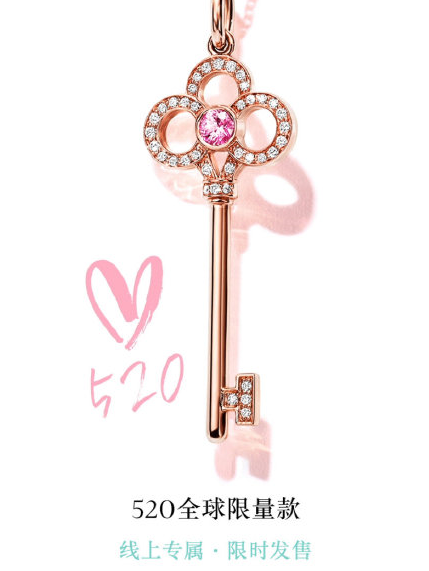
Source: Weibo, 520 limited-edition Tiffany Keys necklace
Takeaways on gift giving culture among Chinese couples
- In the latest year, purchasing a luxury gift for lovers has turned into a measure of love and commitment in a relationship.
- Gift giving among Chinese couples is especially intense during Chinese festivals and shopping events, such as Valentine’s Day, Qixi festival, 520 Day and Singles’ Day.
- Quality, functionality and price are key factors when it comes to purchase a gift for a partner. Chocolate, flowers, jewels, creative presents and apparel are the most common gift giving categories during Chinese lovers’ festivals, while Louis Vuitton and Chanel are in both male and female consumers’ top 3 favorite brands for gifts.
- Luxury brands devote considerable efforts to stand out in China’s gift economy. Tiffany & Co. campaign for 520 Day in 2020 and Valentino Qixi gift box in 2019 are two good examples of how companies attempt to build stronger ties with their Chinese consumers and catch the attention of the younger generations.


